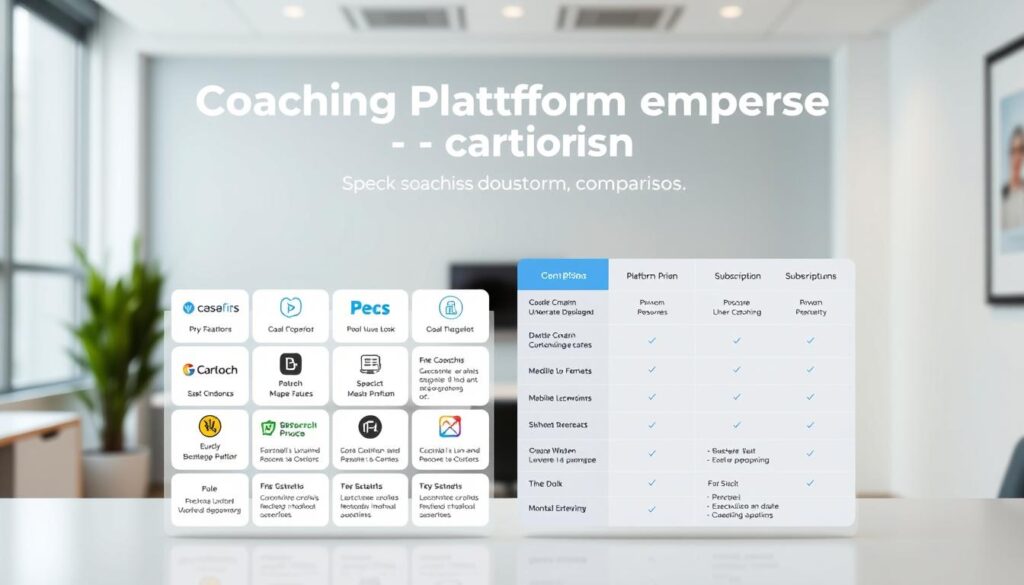“The best way to get started is to quit talking and begin doing.” – Walt Disney
In recent years, the coaching industry has experienced remarkable growth, with the market size projected to reach $20 billion by 2025. This surge in demand presents a unique opportunity for entrepreneurs to build a thriving coaching business. Whether you’re a fitness coach, a life coach, or a business coach, the potential to make a meaningful impact while generating significant income is vast.
This guide is designed to help you navigate the process of starting and scaling a successful coaching business. From choosing the right platform to implementing effective marketing strategies, we’ll cover it all. You’ll learn how to leverage platforms like Mighty Networks and Kajabi to create engaging programs and build a loyal community.
Success in this field isn’t just about expertise; it’s about understanding your clients’ needs and delivering value consistently. By integrating proven tools, scheduling solutions, and community-building techniques, you can create a coaching business that stands out in a competitive market.
Key Takeaways
- The coaching industry is growing rapidly, with a projected market size of $20 billion by 2025.
- Choosing the right platform is crucial for delivering your coaching programs effectively.
- Understanding your clients’ needs is key to creating a successful coaching business.
- Integrating proven tools and scheduling solutions can enhance your business’s efficiency.
- Building a strong community is essential for long-term success in the coaching industry.
Introduction to the Online Coaching Revolution
The world of coaching has undergone a remarkable transformation, ushering in what many call the online coaching revolution. This shift isn’t just about moving from in-person to virtual sessions; it’s about democratizing access to expert guidance and creating new opportunities for both coaches and clients.
Technology and social media have played a pivotal role in this revolution. Platforms like Instagram and LinkedIn have become hubs for coaches to connect with clients worldwide. What was once a niche service for top executives is now accessible to anyone with an internet connection. This accessibility has fueled the industry’s rapid growth, with the market size projected to reach $20 billion by 2025.
The rise of digital tools has transformed how coaching is delivered. Gone are the days of rigid schedules and limited reach. Today, coaches can offer flexible programs that cater to diverse needs. For clients, this means more convenience and personalized attention, leading to higher satisfaction rates.
Industry statistics highlight this growth. Between 2019 and 2022, the number of coaches worldwide increased by 54%. Moreover, 70% of coaches now rely on social media as their primary client acquisition tool. This shift underscores how technology has not only expanded the coaching landscape but also enhanced its effectiveness.
The online coaching revolution is more than just a trend; it’s a fundamental shift in how we approach personal and professional development. With the right tools and strategies, coaches can build thriving businesses that make a real impact.
Understanding the Online Coaching Landscape
The online coaching landscape is shaped by two dominant platform models: marketplace and white-label platforms. Each offers unique benefits and drawbacks, catering to different needs and goals.
Marketplace vs. White-Label Platforms
Marketplace platforms, like Noomi, connect coaches with clients through built-in directories. They offer lead generation but may limit brand control. In contrast, white-label platforms, such as Mighty Networks, allow coaches to create a fully branded experience, giving more control over client relationships but requiring coaches to bring their own audience.
Key Features to Look For
When choosing a platform, consider essential features like scheduling tools, video meeting capabilities, and automated sales funnels. These tools streamline operations and enhance client experience, allowing coaches to focus on what they do best—delivering value.

- Marketplace Platforms: Ideal for new coaches needing client acquisition support.
- White-Label Platforms: Suitable for established coaches wanting brand control.
Evaluating these options carefully ensures coaches select a platform that aligns with their business goals, whether they prioritize lead generation or brand identity.
Uncovering the Benefits and Opportunities in Coaching
Coaching offers a world of possibilities for those passionate about helping others grow. Whether you’re a fitness coach, life coach, or business coach, the flexibility and reach of this profession are unmatched.
Flexible Scheduling and Global Reach
One of the most significant advantages of coaching is the ability to work from anywhere. With a reliable internet connection, you can coach clients across different time zones, creating a schedule that fits your lifestyle. This level of flexibility allows you to balance your personal and professional life effortlessly.
Moreover, coaching enables you to connect with a global audience. Platforms like Instagram and LinkedIn have become essential tools for reaching clients worldwide. What was once a niche service is now accessible to anyone, regardless of location.
Financial Growth Potential
The coaching industry is booming, with many coaches achieving remarkable financial success. High-ticket programs, for example, can generate substantial revenue. Some coaches have even reached 6-, 7-, and 8-figure incomes by leveraging recurring revenue models and community-based structures.
By implementing strategies like automated sales funnels and subscription-based services, you can build a scalable business that thrives over time. The key is to focus on delivering value and fostering long-term client relationships.
“The future of coaching is bright, with opportunities to make a real impact while building a profitable business.”
Identifying Your Niche and Ideal Client
Your journey to a thriving coaching business begins with pinpointing your niche and ideal client. This focus is crucial for effective marketing and building a loyal community.
Finding Your In-Demand Specialty
To choose an in-demand niche, assess your skills, experience, and market needs. For instance, if you excel in fitness, consider specializing in weight loss or sports performance. Popular niches include career coaching for professionals seeking growth or nutrition coaching for those aiming for healthier lifestyles.
Researching client demographics and pain points can guide your niche selection. Use surveys or social media to understand their challenges. This insight helps tailor your program to their needs, ensuring relevance and appeal.

Testing your niche might involve offering discounted packages to gauge interest. This approach allows you to refine your program based on feedback, ensuring it meets market demands effectively.
Defining the Ideal Client Profile
Create a detailed client profile aligning with your expertise. Consider demographics like age, location, and occupation, along with their goals and challenges. For example, a career coach might target mid-level executives seeking promotion strategies.
Understanding client psychographics, such as values and motivations, enhances your program’s personalization. This alignment not only attracts the right clients but also fosters trust and engagement, crucial for long-term success.
A well-defined niche and client profile are vital for effective marketing. They help differentiate you from competitors and ensure your message resonates deeply with your target audience, driving higher conversion rates and business growth.
Designing a Winning Coaching Program
Creating an effective coaching program is essential for attracting and retaining clients. A well-structured program not only enhances client satisfaction but also sets your business up for long-term success.
Structuring Your Course and Session Offerings
A successful coaching program starts with a clear curriculum and session flow. Consider mixing live sessions with pre-recorded content to cater to different learning preferences. For example, bi-weekly live calls can be paired with supplementary materials like video lessons or downloadable guides. This blend keeps clients engaged and provides flexible learning opportunities.

Organizing your program into modules or themes helps clients progress smoothly. A 90-day program, for instance, can be divided into three phases: foundation, implementation, and transformation. Each phase should have specific goals and deliverables to ensure clients feel progress and value.
Integrating Recurring Revenue Models
To scale your business, incorporate recurring revenue streams. Membership programs or bundled packages offer clients ongoing value while providing steady income for you. For example, a monthly membership could include access to exclusive content, group sessions, and community support.
Many coaches have achieved significant growth by offering tiered packages.A basic package might include weekly check-ins, while a premium option adds personalized plans and priority access. These structures not only attract a wider audience but also encourage long-term commitments from clients.
By combining structured sessions with recurring revenue models, you create a coaching program that is both engaging and scalable. This approach ensures your business grows sustainably while delivering consistent value to your clients.
Mastering Online Coaching Platforms
When building a successful coaching business, selecting the right platform is crucial. A robust platform should offer essential features that streamline operations and enhance client engagement.
Top Platform Features for Success
Native scheduling systems and integrated apps like ConvertKit and Calendly are must-have features. These tools automate client interactions, reducing administrative tasks and allowing coaches to focus on delivering value.

Video meeting capabilities and community engagement features are equally important. Platforms like Mighty Networks and Kajabi excel in these areas, providing coaches with the tools to create engaging programs and build loyal communities.
- Must-have features: Scheduling, video meetings, and membership management.
- Benefits: Automation and improved client engagement.
- Examples: Mighty Networks and Kajabi.
These platforms simplify managing sessions and recurring revenue, ensuring a scalable business model. When evaluating features, consider your business goals to choose the best platform for your needs.
Marketing Strategies Tailored for Coaches
Effective marketing is the backbone of any successful coaching business. It’s not just about reaching a wide audience but also about building meaningful connections that turn prospects into loyal clients. For coaches, a well-crafted marketing strategy can make all the difference in standing out in a competitive market.
Building a Strong Social Media Presence
Social media is a powerful tool for coaches to establish credibility and attract clients. Platforms like Instagram and LinkedIn are ideal for sharing valuable content that resonates with your target audience. Consistency is key—regularly posting tips, success stories, and behind-the-scenes glimpses into your coaching process can help build trust and engagement.
Video content, in particular, has proven to be highly effective. Whether it’s a short tip or a live Q&A, videos can convey your personality and expertise, making your audience more likely to connect with you on a personal level. Additionally, engaging with your followers through comments and direct messages can foster a sense of community and loyalty.
Email and Sales Funnel Tactics
Email marketing is another essential tool for nurturing leads and converting them into paying clients. A well-designed email sequence can guide potential clients from awareness to action, ensuring they feel supported every step of the way. Automated email campaigns can save time while maintaining personalized communication.
Combining email marketing with a sales funnel can amplify your results. Start with a lead magnet, such as a free eBook or webinar, to capture email addresses. Then, use targeted follow-up emails to educate your audience about your services and encourage them to take the next step. Tools like ConvertKit can help streamline this process, making it easier to manage and optimize your campaigns.
For more insights on creating effective marketing funnels, check out our guide on affiliate marketing strategies to boost your income.
Overcoming Common Pitfalls in Coaching
Building a successful coaching business requires more than just expertise—it demands a strategic approach to avoid common pitfalls. Many coaches face challenges like inconsistent client acquisition and scaling their business effectively. By understanding these obstacles, you can navigate them successfully.
Addressing Client Acquisition Challenges
One major hurdle is acquiring clients consistently. Coaches often struggle with inconsistent marketing efforts, spreading themselves too thin across multiple platforms. Focusing on a single, well-targeted channel can yield better results than trying to be everywhere at once.
- Inconsistent marketing efforts can lead to a lack of visibility.
- Over-reliance on a single strategy may limit your reach.
For example, some coaches rely solely on social media without building an email list, making their business vulnerable. Diversifying your approach while maintaining focus is key.
Strategies to Scale Your Business
Scaling your business requires efficient systems. Automation tools can streamline operations, from scheduling to client communication. Building a supportive community also fosters engagement and loyalty.
- Automate repetitive tasks to save time and reduce errors.
- Engage your audience through valuable content and interactive sessions.
Real-world examples show that coaches who adapt and learn from setbacks achieve long-term success. Continuous improvement is crucial in this ever-evolving field.
Monetizing Your Coaching Services Effectively
Monetizing your coaching services requires a strategic blend of creativity and practicality. Whether you’re a life coach, business coach, or fitness coach, diversifying your revenue streams can significantly boost your income while delivering value to clients.

One-on-one coaching sessions remain a popular choice, offering personalized attention and higher pricing. However, group coaching and digital products like online courses can expand your reach and create passive income streams. For instance, a fitness coach might offer tiered packages, from basic workout plans to premium personalized programs.
Membership models and subscriptions are powerful tools for recurring revenue. Platforms like Mighty Networks allow you to create exclusive content for members, fostering a loyal community. Many coaches find success by combining high-ticket offerings with lower-priced options to appeal to a broader audience.
Case studies show that coaches who diversify their income streams achieve greater financial stability. For example, a life coach might offer one-on-one sessions, group workshops, and sell eBooks or guided meditations. This approach not only increases earnings but also enhances client engagement and satisfaction.
Testing and optimizing your pricing models is key to long-term success. Start with a base package and gradually introduce premium options. Use client feedback to refine your offerings and ensure they meet market demands. By balancing value with profitability, you can build a sustainable and thriving coaching business.
Integrating Group and One-on-One Coaching Models
Combining group and one-on-one coaching offers a balanced approach that enhances client outcomes and business scalability. This blended model allows coaches to cater to diverse client needs while maximizing revenue streams.
Benefits of Group Coaching
Group coaching provides several advantages, including cost-effectiveness and scalability. It allows coaches to serve more clients simultaneously, making it a profitable addition to any coaching business. Peer support is another significant benefit, as clients can learn from one another, share experiences, and build a sense of community.
- Cost-effective, reaching a larger audience.
- Encourages peer support and shared learning.
- Scalable, increasing business revenue potential.

Optimizing Individual Sessions
While group coaching offers broad reach, one-on-one sessions provide personalized attention, crucial for addressing specific client needs. These sessions allow for tailored advice and deeper client-coach relationships, enhancing overall program effectiveness.
- Personalized attention for individual needs.
- Deeper client-coach relationships.
- Higher value for clients seeking specialized guidance.
Structuring group and individual sessions complementarily involves scheduling group meetings for broader topics and reserving one-on-one sessions for personalized strategies. For example, a fitness coach might offer weekly group sessions for workout plans and bi-weekly individual sessions for nutrition advice.
Creating a Strong Community for Client Engagement
Building a vibrant community is essential for fostering client engagement and loyalty in your coaching business. A supportive environment not only enhances learning but also encourages clients to become advocates for your program.
Leveraging Community Platforms
Top platforms like Mighty Networks offer features such as forums, live discussions, and group activities. These tools help create meaningful interactions, making clients feel connected and valued. For instance, fitness coaches can share success stories to inspire others, boosting overall motivation.
Enhancing Member-to-Member Interactions
Encourage collaboration by setting up small groups or accountability partners. Celebrating milestones and providing educational resources can further strengthen bonds. Regular check-ins and feedback loops ensure clients stay engaged and motivated throughout their journey.

By integrating community elements into your coaching program, you create a nurturing space where clients thrive. This approach not only enhances satisfaction but also fosters a loyal network that drives long-term success.
Utilizing Digital Tools for Scheduling and Automation
Digital tools have revolutionized how coaches manage their time and client relationships. By automating tasks, coaches can focus on delivering high-quality programs and building strong connections with clients.
Top Software and App Solutions
Several tools stand out for their ability to streamline operations. Calendly is a favorite for scheduling, allowing clients to book sessions effortlessly. Zapier automates repetitive tasks like email follow-ups, freeing up more time for client interactions. Platforms like Mighty Networks offer integrated solutions that handle everything from scheduling to community engagement.
- Calendly: Simplifies appointment scheduling and reduces conflicts.
- Zapier: Automates workflows across multiple apps.
- Mighty Networks: Combines scheduling with community-building features.
Using these tools, coaches can minimize manual work and enhance client satisfaction. For example, automated email sequences can nurture leads, while integrated platforms ensure smooth program delivery. The result is a more efficient and client-focused business.

By integrating these solutions, coaches can create a seamless experience for clients, ensuring their business runs efficiently and effectively.
Success Stories and Proven Coaching Models
Seeing others achieve remarkable success can inspire and guide your own journey in the coaching world. Let’s explore some real-life examples of coaches who have built thriving businesses and the strategies that fueled their growth.
Case Studies from 7-Figure Coaches
One standout example is a finance coach who leveraged community-driven platforms to create high-ticket courses. By focusing on engagement and personalized advice, this coach built a loyal client base that drove their business to 7-figure revenues. Another success story comes from a life coach who mastered social media marketing, using platforms like Instagram to share relatable content and attract a global audience.
- Community-Driven Models: Platforms like Mighty Networks enabled coaches to build engaged communities, fostering trust and recurring revenue.
- High-Ticket Courses: Offering premium programs with personalized attention attracted high-paying clients and scaled businesses effectively.
- Digital Marketing Mastery: Coaches who excelled in social media and email marketing saw exponential growth, turning followers into loyal clients.

These success stories highlight the power of combining proven coaching models with strategic marketing. By learning from these examples, you can create a business model that drives growth and impacts lives. For more insights, check out our guide on coaching models that top coaches use.
Final Insights and Informed Decisions for a Thriving Coaching Business
Embarking on the journey to build a thriving coaching business is both exciting and rewarding. From identifying your niche to monetizing your services, every step requires careful thought and strategic planning. To ensure long-term success, it’s essential to weigh the pros and cons of different platforms and tailor your approach to your unique strengths and market needs.
Choosing the right platform is a critical decision. Consider whether a marketplace or white-label platform aligns better with your goals. Marketplace platforms offer built-in client acquisition but may limit brand control, while white-label platforms provide more customization options. Evaluate features like scheduling tools, video meeting capabilities, and community-building features to find the best fit for your business.
Customizing your business approach ensures you stand out in a competitive market. Reflect on your strengths, target audience, and market demands to create a personalized strategy. Whether you’re a fitness coach or a life coach, understanding your clients’ needs allows you to deliver tailored solutions that foster deep connections and loyalty.
As you move forward, consider these actionable next steps:
- Research and select a platform that aligns with your business goals.
- Define your niche and ideal client profile to guide your marketing efforts.
- Develop a structured coaching program that balances flexibility and engagement.
- Implement effective marketing strategies, including social media and email campaigns.
- Continuously seek feedback to refine your approach and improve client satisfaction.
By taking these steps, you’ll be well on your way to building a successful and sustainable coaching business. Remember, the key to long-term success lies in delivering consistent value, staying adaptable, and continuously improving. With dedication and the right strategies, you can create a coaching business that not only thrives but also makes a meaningful impact on your clients’ lives.








